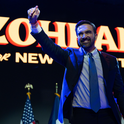It is 70 years since CS Lewis, who wrote more than 30 books—fiction and nonfiction—published an autobiography of his early life. For one born at the end of the Victorian era and who passed away at the dawn of the swinging 60s, Surprised By Joy (1955) remains a remarkable text. Lewis was fascinated by joy and its profound power to transform individuals, communities, contexts and countries, inspiring hope and a sense of possibility.
Lewis had plentiful personal experiences of grief, war and suffering. But the key to his understanding of joy, drawn from the German word Sehnsucht, was not just a fleeting emotion but a transformative force. It was a “signpost” to guide those lost in the darkness, leading them towards the light and freedom. This profound concept of joy inspires and instils hope in our darkest hours. For Lewis, joy was not some personal or aesthetic pleasure but a determined and deep longing for the flourishing of others.
One cannot fail to be surprised by the authentic joy that seems to radiate from the US presidential campaign of Kamala Harris and Tim Walz. Joy is almost impossible to fake, and when people sense it and see it, the organic nature of its authentic depth connects us all, lifting the soul and fostering a sense of unity. Joy is not a skill to be learned or an aptitude to be trained in. As our ancient forebears knew, joy was a naturally occurring fruit of the spirit of God and of life itself (Galatians 5: 22-23). Joy is liberating, empowering, infectious and awesomely powerful.
In 2016, Hartmut Rosa, a professor of sociology at the University of Jena, published a simple book, Resonanz (resonance). Rosa was intrigued by many of the underlying crises of our time—distrust, anxiety, alienation, disenchantment, burnout and more. Put another way, we live in an age of gloom and doom. As Shakespeare says in Macbeth (Act III) we are “…so weary with disasters, tugg’d with fortune, that I would set my life on any chance, to mend, or be rid on’t.”
Rosa held that resonance is a normal human and social experience. It has a transformational impact on our affections and relationships and can counter the alienation of modernity. We may well puzzle at how fascism, populism, autocracy, and dictatorships seem to sway crowds and win support. The answer lies in resonance—a rhetoric that taps into personal and communal fears and anxieties and transfers them to other groups. Migrants, minorities and communities that are “othered” will know this to their significant cost. Holocausts and genocides are founded in the resonance of dark myths that stoke fears and anxieties.
Amidst the prevailing gloom and doom, joy emerges as a powerful antidote. It pierces through the darkness like a shaft of light, leading us from despair to hope. Joy is not a superficial emotion but a tangible, deep and authentic force. It contrasts starkly with the snarling cynicism and bitter rhetoric often dominating our discourse, offering a far higher good.
Joy resonates with us because of its infectious nature and capacity to carry hope, peace, patience, resilience and courage. It is realistic, acknowledging the inevitable fights, hurts and losses. Yet, joy remains undeterred, radiating a profound mystery that Lewis found in his Christian faith—a deep spiritual wisdom where love conquers hate and light prevails over darkness.
Politics is a serious business often fought with an alloy of hard, unctuous words and hotly contested visions for the future. So, we are always surprised by genuine joy when we find it in politics. We saw hints of it in Barack Obama’s campaigning in 2008 and 2012. But now we see it in the exuberance and effervescence of the Harris-Walz campaign. It is written on the sheer glow of faces at rallies and registers in the rhetoric from the podium. This is the resonance of joy.
Yet the current vice president’s adoption of the term “joyful warriors” as nomenclature for Democrat activists is not some hearkening back to the Amazon women warriors of ancient Scythia. Instead, it draws on the more powerful, authentic religious character of joy that many ancient faiths still bear testimony to.
Joy is a rare form of implicit theology that offers hope and faith for all the challenges that lie ahead. Archbishop Desmond Tutu, Rabbi Lionel Blue, Pope Francis and other religious leaders have all served as ambassadors for joy. Jovial by nature, they also represent fine exemplars of grounded humility. In testing times, it is rare to be surprised by joy originating from political leaders. Yet it inspires when it is there, even in the darkest episodes of human history. Joy lights the way. It is authentic, organic, hopeful and faithful. It is always our better path.












